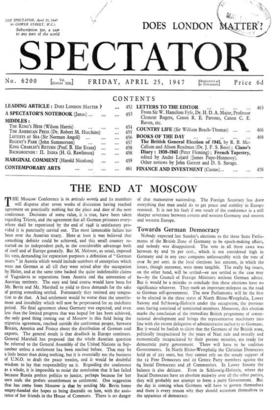THE END AT MOSCOW
THE Moscow Conference is in articulo mortis and its members will disperse after seven weeks of discussion having reached agreement on practically nothing but the place and date of the next conference. Decisions of some value, it is true, have been taken regarding Trieste, and the agreement that all German prisoners every- where shall be repatriated by the end of 1948 is satisfactory pro- vided it is punctually carried out. The most lamentable failure has been over the Austrian treaty. Here at least it was believed that something definite could be achieved, and this small country re- started on its independent path, to the considerable advantage both of itself and of Europe generally. But M. Molotov, as usual, imposed his veto, demanding for reparation purposes a definition of " German assets " in Austria which would include numbers of enterprises which were not German at all till they were seized after the occupation by Hitler, and at the same time backed the quite indefensible claims of Yugoslavia to reparations from Austria and the annexation of Austrian territory. The easy and fatal course would have been for Mr. Bevin and Mr. Marshall to yield to these demands for the sake of getting something settled. Fortunately they resisted any tempta- tion to do that. A bad settlement would be worse than the unsettle- ment and instability which will now be perpetuated for an indefinite period. No final agreement about Germany was expected, and even less than the limited progress that was hoped for has been achieved, the only good thing coming out of Moscow in this field being the tripartite agreement, reached outside the conference proper, between Britain, America and France about the distribution of German coal exports. The general result is that deadlock in Europe continues. General Marshall has proposed that the whole Austrian question be referred to the General Assembly of the United Nations in Sep- tember unless a settlement has been reached before. That may be a little better than doing nothing, but it is essentially not the business of U.N.O. to draft the peace treaties, and it would be doubtful wisdom to lay that responsibility on it. Regarding the conference as a whole, it is impossible to resist the conclusion that it has failed because Russia prefers politics to justice, perhaps because for her own ends she prefers unsettlement to settlement. One suggestion that has. come from Moscow is that by sending Mr. Sevin home empty-handed she hopes to bring discredit on him, with the assis- tance of her friends in the House of Commons. There is no danger
of that manoeuvre succeeding. The Foreign Secretary has done everything that man could do to get peace and stability in Europe restored. It is not his fault if one result of the conference is a still sharper severance between eastern and western Germany and eastern and western Europe.


































